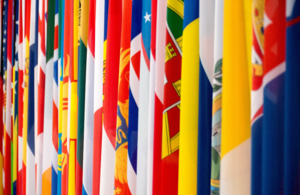Head of the OSCE Programme Office in Nur-Sultan: UK statement
Ms. Deirdre Brown, Deputy Head of the UK Delegation to the OSCE, responds to Ambassador Frobarth from the OSCE Programme Office in Nur-Sultan.

Thank you Madam Chair. I would like to join other speakers in welcoming you Ambassador Frobarth to the Permanent Council. Congratulations on your appointment, and thank you for your thorough report.
Kazakhstan is an important partner for the United Kingdom, and we look forward to continuing and expanding our bilateral cooperation with you and them, working to fulfil OSCE commitments.
I was pleased to read in your report of the frequent engagement you have had with the host government, including meetings on the importance of exchanges with civil society in implementing the legislative reforms stemming from the presidential agenda on political modernisation and liberalisation. We encourage active engagement with civil society generally and their consultation in the reform processes.
Additionally, I hope that the process of political modernisation includes taking into account the recommendations made by ODIHR following the January elections. These will ensure that the electoral system fully lives up to Kazakhstan’s international obligations and commitments.
I would like to take this opportunity to commend you and your team for the work you have done to respond to the challenges of COVID-19, including fulfilling your mandate and responding to the emerging needs in your host country. It was very good to read that you were able to build the capacity of thirteen crisis centres providing assistance to people subjected to increasing incidence of domestic violence; as well as developing an educational video on gender-based violence.
Madam Chair, I would like to draw attention to three areas of the report that I think deserve our special attention.
First, on cyber.
While the UK understands the inherent advantages to an interconnected world, cyber-attacks seek out vulnerability regardless of national borders. With the increase of cybercriminal activities last year and the increased risks for many citizens of becoming victims of cyber crime activities, it is right that the Office supported events to raise public awareness of the risks of cyber and to build the capacity of law enforcement agencies.
Second, on media freedom.
The UK warmly welcomes the provision of a platform for government agencies, civil society, and the media community to discuss the challenges of the country’s media legislation. And we were pleased to learn that the Office supported the Annual Central Asian Forum on Internet Development on issues such as the safety of journalists.
As ODIHR said in their Statement of Preliminary Findings and Conclusions following the January elections, public dissent in Kazakhstan can result in sanctions, prosecutions and detentions. This deters alternative voices throughout the country, impacts on citizens’ behaviour, and stifles genuine political debate.
Finally, on gender equality.
I was pleased to read that you sought to find ways to promote gender mainstreaming in every project your office undertook; and the work you have done on women’s economic empowerment through the rural women’s forum is of special interest.
Particularly noteworthy is your partnership with NGOs, government, and multinationals to involve women in the green economy and highlight women’s achievements and contributions to agriculture. It is encouraging to read that your work to promote the role of women has resulted in the election of two participants of the forum as members of the Parliament of Kazakhstan.
Madam Chair, I would like to finish by again thanking you Dr Frobarth for your presentation today and the great deal of collaboration your office undertakes to deliver your work. Please do extend this cooperation to the diplomatic missions in Nur-Sultan. I know that my colleagues in the British Embassy there are eager to continue collaborating and partnering with your Office, including in delivering common objectives in all three dimensions.
Thank you.